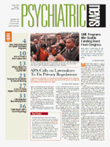I read with interest your article “Cultural Differences Can Impede Relationship Between IMGs, Patients” in the December 15, 2000, issue.
Despite being an international medical graduate (IMG) myself, I have experienced my IMG status in the U.S. as rather the opposite of what Dr. Gabrielle F. Beaubrun describes. It seems that my different background, far from being an impediment, has served me rather well on a variety of occasions. How could I forget the paranoid patient who, to my surprise, felt relieved when told that English was not my native language? I later realized, feeling that he could shift the blame for possible misunderstandings from his psychosis to my perceived inexperience and freshness, allowed him to put down his guard and start opening up. On the basis of this and similar experiences, one could argue that, as an IMG, one has an advantage: it is in fact easier to convey naturally more, not less, of the neutral, unbiased, therapeutical stance that any psychiatrist values so much.
Second, it is generally acknowledged that minorities have a harder time relating to the majority, but usually have a better rapport with any other minority. Not surprisingly, being an IMG, and therefore belonging to a minority, I often find myself having fewer, not more, difficulties with patients, which raises a number of barriers when examined by my American colleagues.
I agree about the importance of understanding the specific cultural context, and I think that cannot be overemphasized in a country so ethnically diverse as the United States. I also agree that building cross-cultural competency remains a critical issue during psychiatry training, and I am glad to see that the Accreditation Council for Graduate Medical Education addresses it in its guidelines.
Allow me to think that such a critical issue has equal relevance for both international and American medical graduates. I see the singling out of IMGs as having no benefit but carrying a few serious risks. First is the implication that an American graduate is culturally competent and sensitive. On the basis of such an assumption, one can argue against a need for further training for American graduates as unnecessary or redundant. Is this warranted? Second, pointing to IMGs can only add to a common (mis)perception of IMGs as being less competent doctors. Speaking to this, I was frankly offended by the article’s headline, which almost stated that being an IMG is an impediment in developing a good doctor-patient relationship—and this article discussed issues of cultural sensitivity. Where is the “cultural sensitivity” toward IMGs as a group and a minority?
